Sungkyunkwan University: Shaping Talent for the AI Semiconductor Era
Founded in 1398, Sungkyunkwan University (SKKU) is one of Asia’s oldest universities and is celebrated as Korea's "cradle of semiconductor talent". The university excels in disciplines closely tied to the semiconductor industry—materials science, electrical and electronic engineering, data science, and artificial intelligence—ranking 6th, 7th, and 4th respectively in Korea in the 2025 QS World University Rankings by Subject.[1] Confronting AI-driven industrial transformation, SKKU fosters semiconductor innovation talent through university-industry collaboration, interdisciplinary programs, and international resource integration. With industry demand as its guide, the flexibility of a private university, and government support, SKKU integrates AI education with the intelligent upgrading of traditional industries, aiming to close the gap between academia and production lines and swiftly convert talent into technological competitiveness.
Employment Upon Enrollment?
Since the appointment of President Ji-Beom Yoo, SKKU has embraced the educational philosophy of "tackling the Grand Challenge for the humanity and future society". The university is committed to educational reform by integrating the humanities and social sciences with the natural sciences, generating new knowledge value, and building platforms to lead emerging industries. [2] With the ambition of redefining global academic leadership, SKKU continuously expands academic programmes and deepens industry-academic collaboration to nurture specialists in frontier fields. This model not only consolidates South Korea' s technological strengths but also demonstrates how education–industry alignment can generate tangible breakthroughs. The semiconductor discipline stands as one of the most prominent examples.
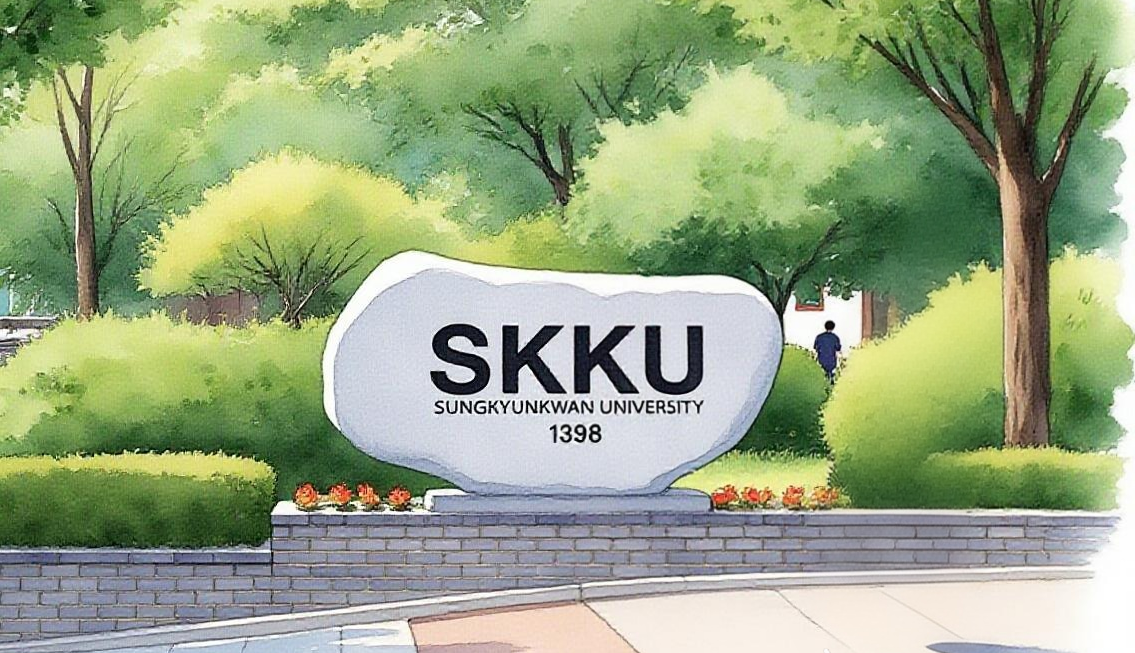
According to the Korea Semiconductor Industry Association(KSIA), the industry will require 300,000 professionals by 2031, but current supply falls far short. At this pace, South Korea will face a shortage of 54,000 skilled workers by 2031.
As South Korea's "lifeline industry", semiconductors accounted for more than 20% of exports in 2023. The industry spans the entire value chain from materials, equipment, design, manufacturing, where AI applications such as virtual fabs and intelligent inspection systems are significantly improving chip design efficiency, production yields, and equipment automation, thereby lowering manufacturing costs. Yet this sector undergoes an acute talent shortage.

Source: SKKU Official Website
Recognising the strategic importance of specialised talent, South Korean semiconductor firms are investing heavily in education and training to reinforce their global leadership. Meanwhile, AI- and machine-learning–driven smart software has become central to consumer electronics and connected devices, enabling real-time responsiveness. For example, as a global ICT and mobile communications leader, Samsung Electronics integrates AI into semiconductors, smartphones, TVs, appliances, and networks, intensifying its demand for highly skilled AI professionals.
As a prestigious private university, SKKU leverages its flexible industry–academic collaboration mechanisms to respond swiftly to industrial needs. Its leadership includes seasoned experts from Samsung, SK Hynix, and other companies, giving the university a unique ability to anticipate industry trends and adapt curricula accordingly, ensuring that "what students learn is what they will use". Partnering with Samsung, SKKU has pioneered a new model of AI talent cultivation that goes beyond government-led industry–academia platforms or company-run training centres. From launching the Department of Intelligent Software to establishing the Department of Battery Science and Engineering, SKKU designs its programmes to directly meet industry demand.
In 2022, SKKU and Samsung Electronics jointly established the Department of Intelligent Software, under the College of Computing and Informatics. [3] Operated on a contract-based model, the department guarantees graduates direct employment with Samsung Electronics, with tuition fully funded by the company. The five-year programme is designed to cultivate AI specialists through a systematic, high-level training framework. Covering both undergraduate and graduate coursework across ten semesters, the programme dedicates the first seven semesters to foundational theory in AI and software engineering, and the final three semesters to graduate-level practical training. Students gain comprehensive expertise in intelligent software development through internships, research visits to overseas institutions, and participation in international conferences. In this collaboration, SKKU provides the academic infrastructure to equip students with advanced AI skills, while Samsung secures a pipeline of elite talent tailored to its needs. Compared to state-led integration platforms or corporate in-house training, this company-driven model is more direct and systematic, injecting fresh vitality into Korea's intelligent software industry.

Samsung Library Source: SKKU Official Website
The scope of collaboration continues to expand. One of SKKU' s newest departments, the Department of Battery Science and Engineering, was established in partnership with Samsung SDI. Its mission is to train next-generation battery technology experts to meet the soaring demand of the global renewable energy market.
Blending the Virtual and the Real
While Sungkyunkwan University has built deep roots in domestic university–industry collaboration, it is also actively expanding its global partnerships. To alleviate the heavy financial burden that semiconductor laboratory equipment imposes on universities, SKKU has teamed up with global semiconductor equipment leader Lam Research to launch the "K-Semiconductor Talent Development Programme", aimed at cultivating highly skilled professionals for the chip industry. Lam Research, which entered the Korean market in 1989, is today a key player in the semiconductor cluster located in southern Gyeonggi Province.
This initiative, jointly promoted by Lam Research, SKKU' s College of Engineering, and the Korea Semiconductor Industry Association, will begin with a one-year pilot in 2025 before expanding into a full programme spanning bachelor' s, master' s, and doctoral-level training. Lam Research has committed USD 5.2 million to the project, providing certified courses and professional training resources. The highlight of the programme is its Semiverse™ solution, a virtual fab system that leverages advanced digital twin technology to allow students to experience the entire semiconductor production process, from chip design to manufacturing, directly in the classroom. This approach overcomes the traditional spatial and technical constraints of semiconductor education. [4]
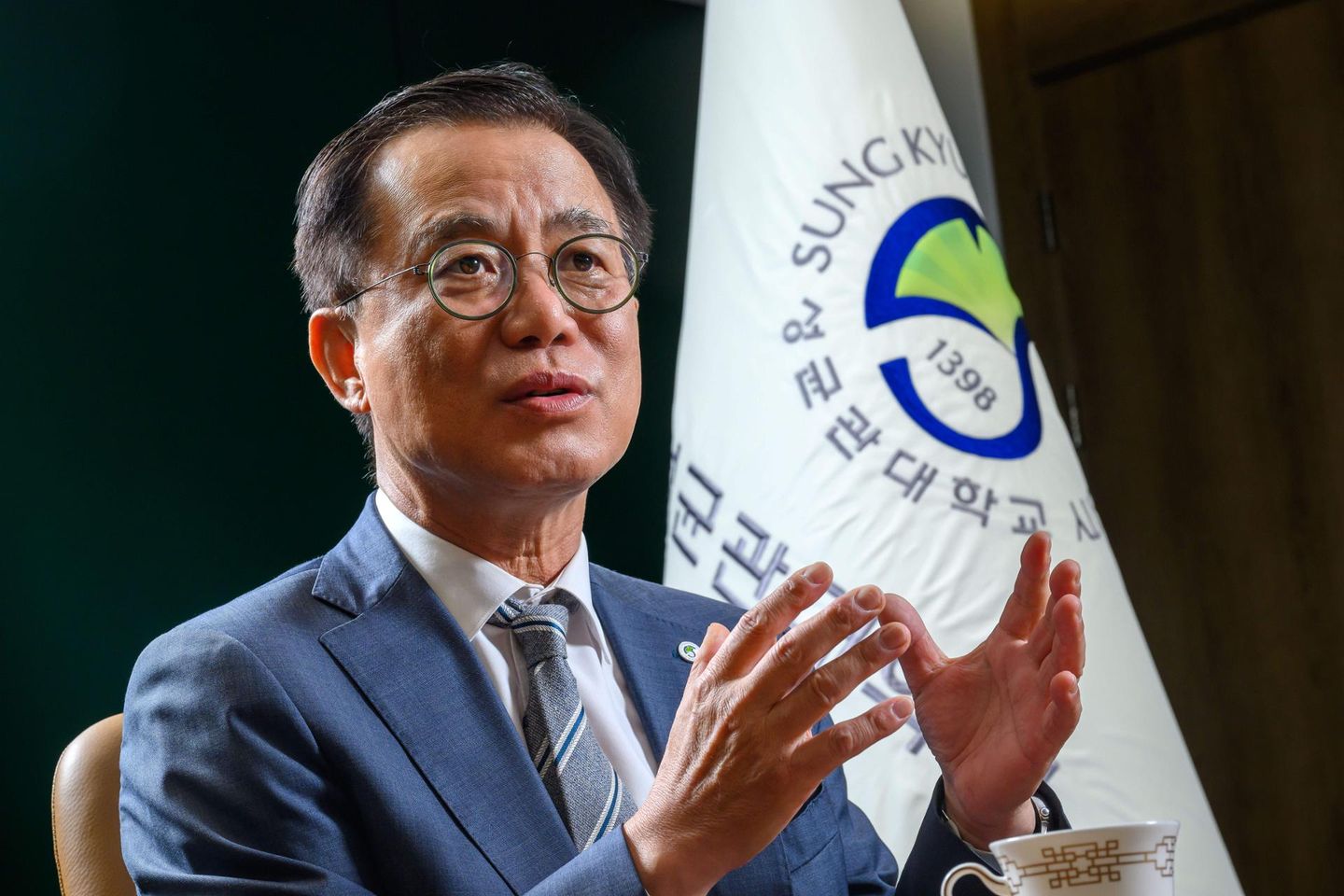
Source: SKKU Official Website
Through tools such as SEMulator3D, students gain immersive, hands-on training in chip design and manufacturing. This marks the first time Lam Research has introduced its Semiverse talent development platform in a Korean university, after implementing similar collaborations in the United States and India. SKKU notes that this "blended virtual–physical" teaching model fills critical gaps in conventional semiconductor education, significantly enhancing students' employability. Beyond strengthening SKKU' s globalised talent development framework, the partnership also supplies South Korea' s semiconductor industry with a new generation of practically skilled professionals. By incorporating a world-leading virtual training platform, the university is helping to deliver graduates with stronger real-world capabilities.
In 2024, SKKU further established the School of Applied Convergence, primarily targeting working professionals. The school offers two specialised tracks, AI Convergence Operations and Industrial AI, with a strong focus on practical skill development to address complex, real-world challenges across industries. This initiative consolidates SKKU's leadership in university–industry collaboration and further reinforces its role as a pioneer in practice-oriented AI education.
Igniting Regional Innovation
Sungkyunkwan University excels not only in corporate collaboration but also in working hand-in-hand with local governments, serving as a model for regional collaborative innovation. In 2024, SKKU and Seongnam City signed a strategic agreement to jointly establish "Seongnam-Sungkyunkwan University Fabrice and AI Innovation Research Centre". [5] This industry–academia–government research platform injects strong R&D momentum into the region's high-tech industries. Through the establishment of the Fabrice and AI Innovation Research Centre, the initiative further consolidates Seongnam's position as a leading hub for high-tech talent development in Korea, while fueling new drivers for regional economic growth.
National-Level Talent Development Programmes
In June 2025, South Korea' s Ministry of Science and ICT officially designated SKKU and Yonsei University as the two core universities for the "Industrial-linked Artificial Intelligence Semiconductor Leading Technology Talent Cultivation Programme". [6] This national initiative, spanning six years and beginning with an initial investment of 1 billion KRW in its first year, aims to nurture master' s and doctoral-level talent equipped with practical skills tailored to the AI semiconductor industry.
To achieve this, the two universities jointly established the AI Semiconductor Innovation Institute, which develops integrated industry–academia research and curricula. This "government sets the stage, industry takes the lead" model has proven highly effective in accelerating progress. At SKKU, the initiative is spearheaded by Professor Sang-Hyun Lee of the Department of Semiconductor Systems Engineering, who focuses on four major research areas: Next-generation neural processing unit (NPU) development; System-on-chip (SoC) intellectual property strategy; Hardware–software co-design optimisation and AI computing platform construction.
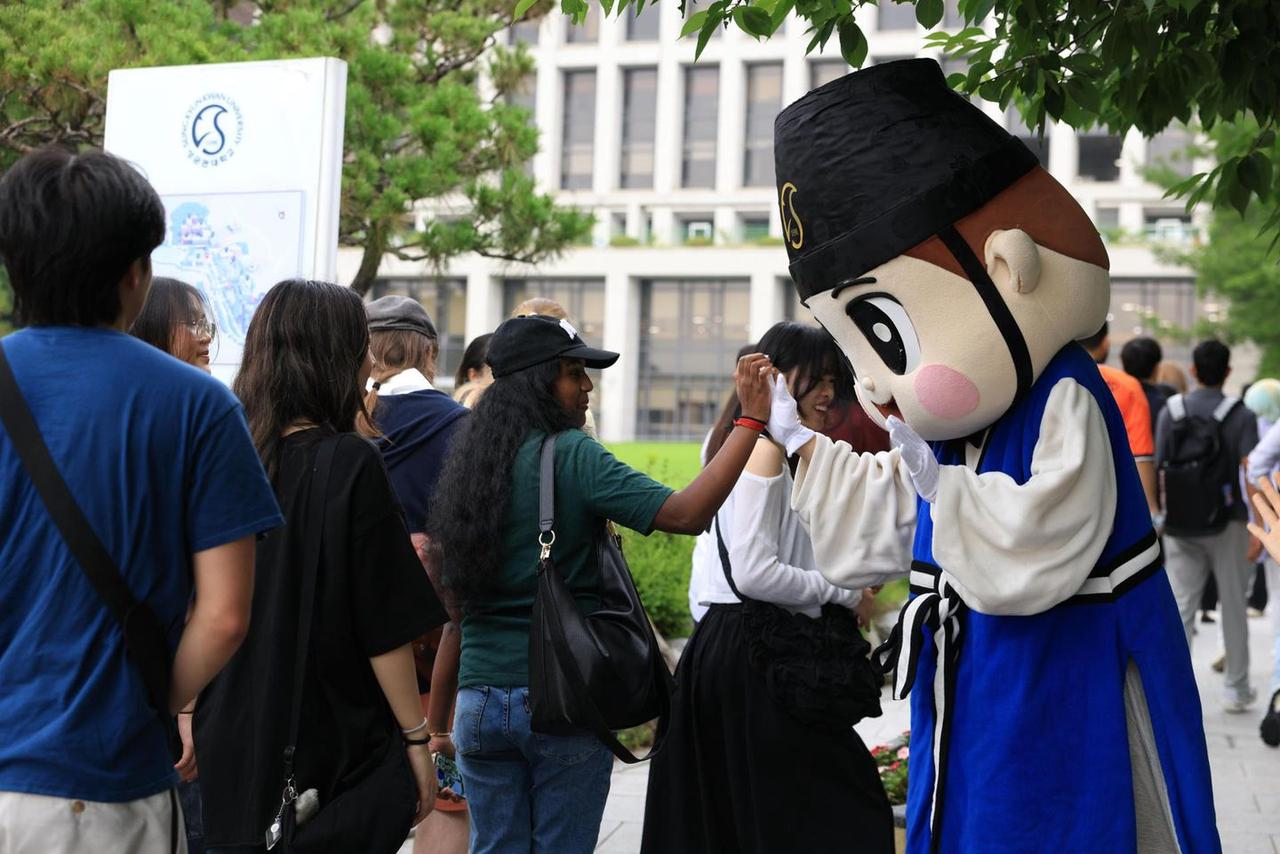
Source: SKKU Official Website
To advance these goals, SKKU has established four dedicated research centres: the NPU Core Centre, NPU Infrastructure Centre, Physical AI Centre, and AI Computing Platform Centre. Each centre works closely with industry leaders such as Mobileint, Open Edge Technology, Boss Semiconductor, and Samsung Electronics, ensuring that research outputs remain tightly aligned with industrial needs.
Conclusion
Through deep collaboration between universities and enterprises, Korea has not only accelerated the pace of technological innovation but also ensured a steady pipeline of highly skilled professionals for industry. This reflects a systematic approach driven by industrial demand, combining digital transformation in education with innovative talent cultivation mechanisms.

Source: SKKU Official Website
In the context of rapidly evolving artificial intelligence technologies, such "learning-by-doing" education models may prove to be critical strategies for securing and sustaining global competitiveness. For many developing countries, "virtual–real blended" training approaches, such as leveraging virtual simulation technologies to compensate for limited hardware, offer a practical pathway to delivering high-level engineering education despite resource constraints. Equally noteworthy is the model of mobilising direct corporate investment in education and deeply embedding industrial resources into academic ecosystems, which provides valuable insights for future global talent strategies.
Reference:
[1] QS, "Top Universities," Top Universities, 2025. https://www.topuniversities.com/university-subject-rankings/materials-sciences?countries=kr (accessed Sep. 02, 2025).
[2] J. Da-hyun, "Sungkyunkwan University puts global impact at center of leadership vision," Koreatimes.co.kr, 2025. https://www.koreatimes.co.kr/southkorea/society/20250706/sungkyunkwan-university-puts-global-impact-at-center-of-leadership-vision (accessed Sep. 02, 2025).
[3] 동아일보, "Samsung, Sungkyunkwan Univ. to form 'Department of AI,'" 동아일보, 2022. https://www.donga.com/en/article/all/20221226/3850825/1 (accessed Sep. 02, 2025).
[4] T. Kim, "Lam Research Reinforcing Semicon Ecosystem in Korea," 테크월드뉴스, 2024. https://www.epnc.co.kr/news/articleView.html?idxno=307170 (accessed Sep. 02, 2025).
[5] J. Jung, "Seongnam City, Gyeonggi Province, announced on the 29th that it will operate a fabless and AI innova.," MAEIL BUSINESS NEWSPAPER, 2024. https://www.mk.co.kr/en/society/11003294 (accessed Sep. 02, 2025).
[6] H. Seoyoon, "The Ministry of Science and ICT announced on the 12th that Sungkyunkwan University and Yonsei Univer.," MAEIL BUSINESS NEWSPAPER, 2025. https://www.mk.co.kr/en/society/11340998 (accessed Sep. 02, 2025).
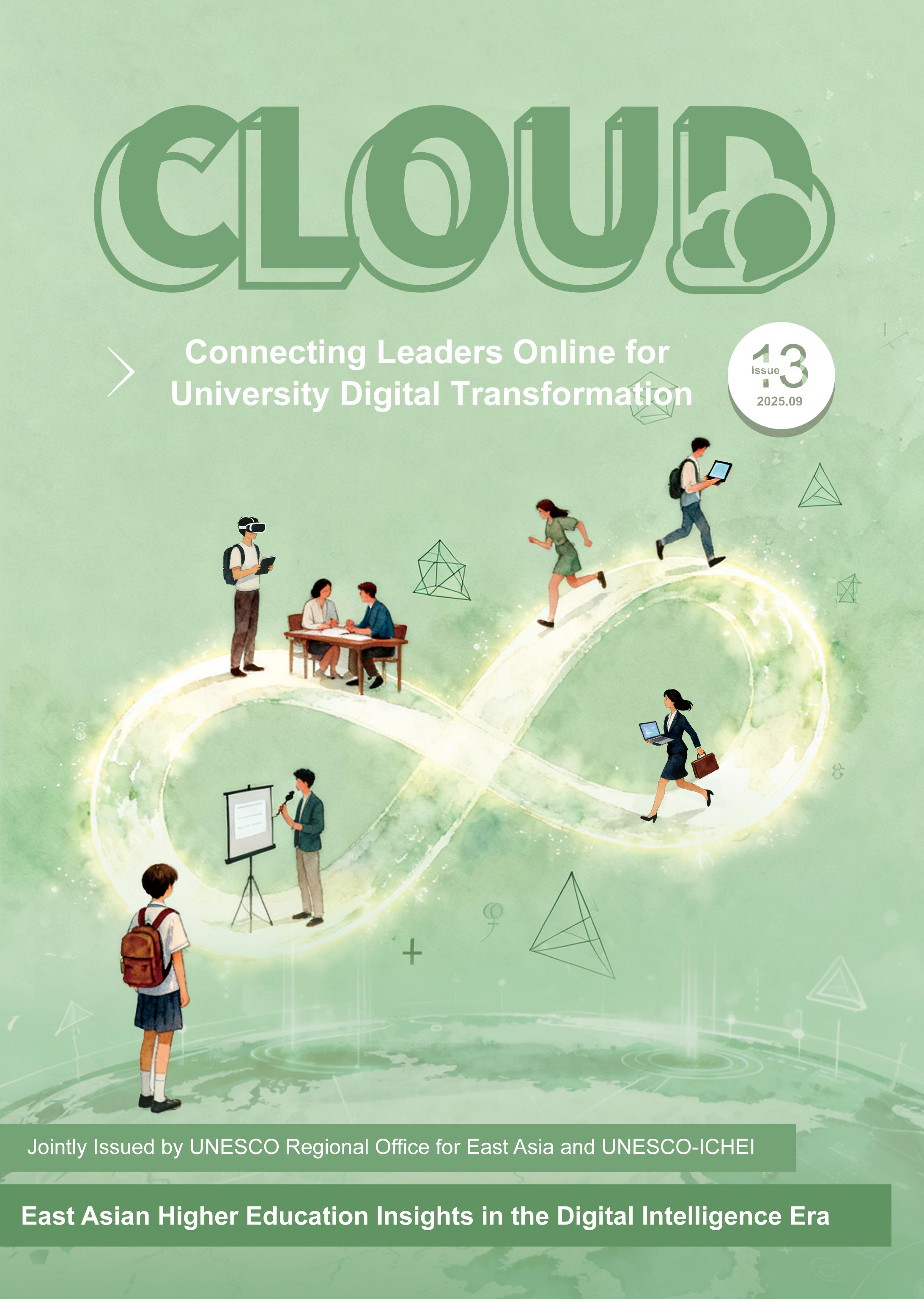
- Tohoku University: How to Address an Ageing Society through “AI + Healthcare”
- Industry Demand-Driven: South Korea's AI Talent Development Policies and Practices
- Sungkyunkwan University: Shaping Talent for the AI Semiconductor Era
- Riding the Wave: The Diverse “AI+” Disciplinary Ecosystem in Chinese Higher Education
- AI in Higher Education: Lessons from the EU
- Dialogue with CLOUD: Interview with the IIOE Mongolia National Centre
- Integrating Generative AI into Japanese Higher Education: Policy Responses, Pedagogical Practices, and Future Directions
- UNESCO Regional Office for East Asia: Seeking an Inclusive Future amid Opportunities and Challenges


